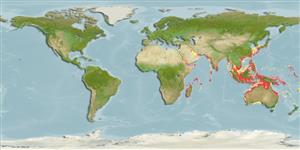>
Dactylopteriformes (Flying gurnards) >
Pegasidae (Seamoths)
Etymology: Pegasus: Taken form the winged horse of Perseus in the ancient Greek, mithology (Ref. 45335); volitans: From the Latin word 'volitans' meaning to fly.
More on author: Linnaeus.
Environment: milieu / climate zone / depth range / distribution range
นิเวศวิทยา
เกี่ยวกับทะเล,น้ำเค็ม; กร่อย สัตว์น้ำหน้าดิน; ระดับความลึก 1 - 73 m (Ref. 11441), usually 9 - 27 m (Ref. 1418). Tropical; 36°N - 37°S
Indo-West Pacific: Delagoa Bay, Mozambique to Saudi Arabia (Persian Gulf) and throughout Gulf of Manaar to Bay of Bengal; along the east coast of Myanmar; north to Japan, south to tropical Australia (Ref. 1418) and Papua New Guinea (Ref. 6192).
ขนาด / น้ำหนัก / Age
Maturity: Lm ? range ? - ? cm
Max length : 20.0 cm TL เพศผู้/กระเทย; (Ref. 90102)
Short description
เครื่องมือที่ใช้ในการแยกชนิดสัตว์,สิ่งมีชีวิตออกจากกัน | สัณฐานวิทยา | ความยาวต่างๆ
เงี่ยงครีบหลัง (รวม) : 0; ก้านครีบอ่อนที่หาง (รวม) : 5; เงี่ยงครีบก้น: 0; ก้านครีบอ่อนที่ก้น: 5; สัตว์มีกระดูกสันหลัง: 21. Body light brown or olive to dark brown-black dorsally and laterally, lighter ventrally. Tubercles absent on surface of carapace; no scales on orbit; distal margin of dorsal and anal fins perpendicular to horizontal axis of body. 4 pairs of dorsolateral body plates; 5 pairs of ventrolateral body plates; tail rings 12, anteriormost 9 mobile, last 3 fused; a lateral pair of posteriorly directed spines on terminal tail rings; suborbital shelf convex obscuring eye from ventral view; deep pits absent. Rostrum monomorphic and spatulate.
A rare species (Ref. 4264) collected from muddy and sandy bottoms of estuaries and bays. Known to 'walk' over the bottom using its tentacular pelvic fins. Juveniles expatriate to tropical regions; adults mainly found in muddy estuaries where they pair. Sometimes they are seen partly buried but also feed during the day. Sometimes found floating on the surface (Ref. 48635). Sometimes occurs in seagrass areas (Ref 90102). Feeds on small benthic organisms (Ref. 68964).
Life cycle and mating behavior
วัยเจริญพันธุ์ | การสืบพันธุ์ | การวางไข่ | เซลสืบพันธ์ของเพศเมีย(ไข่) | ความดกของไข่ | ตัวอ่อน
Palsson, W.A. and T.W. Pietsch, 1989. Revision of the Acanthopterygian fish Family Pegasidae (Order Gasterosteiformes). Indo-Pac. Fish. (18):38 p. (Ref. 1418)
IUCN Red List Status (Ref. 130435: Version 2024-1)
Threat to humans
Harmless
Human uses
การประมง: การค้า
เครื่องมือ
Special reports
Download XML
แหล่งที่มาจากอินเตอร์เน็ต
Estimates based on models
Preferred temperature (Ref.
123201): 23.8 - 29.1, mean 28.1 °C (based on 1202 cells).
Phylogenetic diversity index (Ref.
82804): PD
50 = 0.5781 [Uniqueness, from 0.5 = low to 2.0 = high].
Bayesian length-weight: a=0.01000 (0.00244 - 0.04107), b=3.04 (2.81 - 3.27), in cm total length, based on all LWR estimates for this body shape (Ref.
93245).
ระดับชั้นอาหาร (Ref.
69278): 3.5 ±0.37 se; based on food items.
Fishing Vulnerability (Ref.
59153): Low vulnerability (10 of 100).
